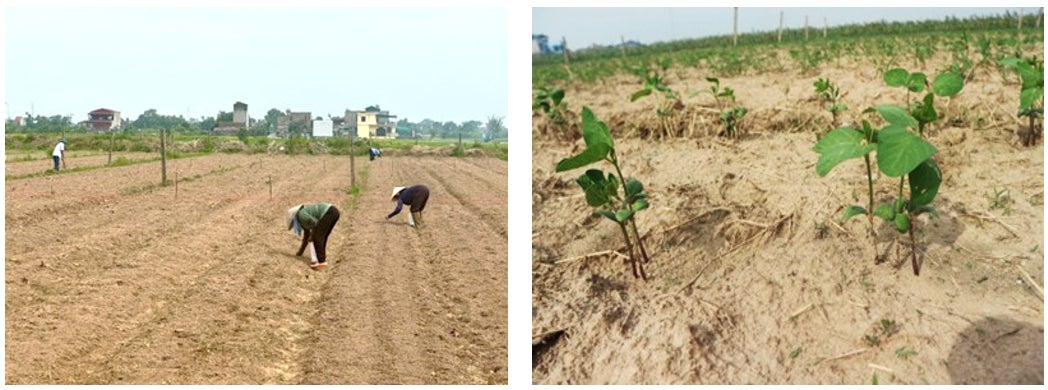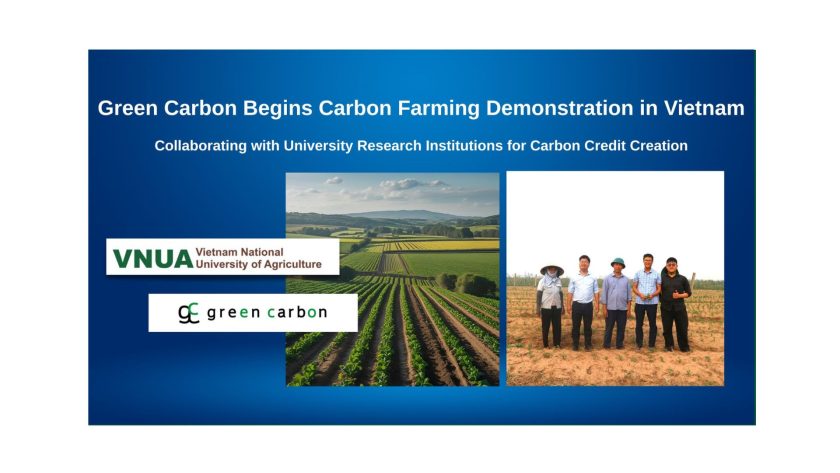We aim to promote sustainable agriculture by utilizing soybeans as a cover crop to sequester carbon in the soil.
Green Carbon Inc. (President: Jun Okita, hereafter “Green Carbon”) is excited to announce the launch of a joint demonstration project. This project, undertaken in collaboration with the Center for Organic Agriculture Promotion and Studies and the Center for Experiment and Vocational Training (Vietnam National University of Agriculture, hereinafter “VNUA”), and the Agricultural Genetics Institute (hereinafter “AGI”), aims to create carbon credits by introducing soil carbon sequestration farming (carbon farming *1) utilizing soybeans as a cover crop.
This project aligns with Verra’s *2 VM0042 methodology, an international carbon credit standard. It seeks to promote both carbon sequestration in agricultural soils and sustainable agriculture. The demonstration officially began in May 2025 at an experimental farm in Nam Dinh Province.
○ For inquiries regarding this release and further details, please contact here
○ Download Green Carbon Inc. company overview here
◆Background to This Project Agreement
Green Carbon is engaged in creating nature-based carbon credits primarily across Southeast Asia, developing projects in a wide range of fields including forest conservation, rice paddies, mangrove reforestation, methane reduction from cattle, and biochar projects. We develop carbon credit creation projects suited to the characteristics of each region’s natural resources, and achieve efficient and transparent project operation through appropriate site selection and monitoring utilizing satellite data. Particularly in Vietnam, they are advancing a flagship project for methane gas reduction in rice paddies using AWD (Alternate Wetting and Drying) *3. In August 2024, we established a Vietnamese branch office and have currently signed MOUs with 22 provinces in the country to further project development.
Furthermore, with the aim of promoting sustainable agriculture and generating agriculture-derived carbon credits in the Southeast Asian region, Green Carbon has signed an MOU with the Southeast Asian Regional Center for Graduate Study and Research in Agriculture (SEARCA), which is under the umbrella of the Southeast Asian Ministers of Education Organization (SEAMEO). While promoting cooperation in nature-based carbon credit project development, we are also focusing on carbon farming to enhance soil carbon sequestration.
Based on these achievements, Green Carbon Japan Vietnam Co., Ltd. (hereinafter: “Vietnamese Subsidiary”), VNUA, and AGI have concluded an MOU and commenced this project, aiming to reduce greenhouse gas emissions in Vietnam’s agricultural sector and improve soil health. In this project, by utilizing soybeans, which have the ability to fix nitrogen, as a cover crop, we aim to enhance the soil’s carbon sequestration capacity, improve soil fertility and structure, and contribute to the reduction of chemical fertilizer usage. Through these efforts, we will strive to establish a scalable foundation for carbon credit creation that complies with Verra standards.
◆Project Overview and Utilized Technologies
Under the MOU, each organization will undertake the following roles and collaborate closely to advance the project:
| AGI (Agricultural Genetics Institute) |
|---|
| ・Supply and evaluate soybean seed varieties from the institute’s collection and other sources. ・Identify the most suitable varieties for use as a cover crop under Verra’s VM0042 methodology. |
| VNUA (Vietnam National University of Agriculture) |
|---|
| ・Lead on-site trials, soil sampling, and engagement with farmers. ・Provide technical consulting and training to help farmers replicate and scale the model. |
| Green Carbon Japan Vietnam Co., Ltd. |
|---|
| ・Oversee project operations and ensure compliance. ・Promote research and development of new soybean varieties and other cover crops adapted to Vietnam’s diverse ecological regions. ・Provide training to enhance the skills and awareness of the local communities participating in the project. |
| Green Carbon(headquarters) |
|---|
| ・Provide technical guidance for carbon credit creation and support for validation and verification. |
This project consists of the following two steps:
〇Step 1 (May 2025- September 2025)
We’ll conduct small-scale demonstration trials at an experimental farm in Nam Dinh Province to collect baseline data and evaluate the effectiveness of cover crops.
〇Step 2 (October 2025 – January 2026)
Based on the results from Step 1, we’ll implement pilot introductions in selected local agricultural regions.
<About technologies and methodologies utilized>
This project will utilize Verra’s VM0042 methodology: “Improved Agricultural Land Management,” a globally recognized carbon accounting framework. By introducing soybeans as a cover crop during fallow periods (when no main crop is cultivated), we aim to enrich the soil, prevent erosion, and enable long-term carbon sequestration.
For the carbon credit creation and certification process, rigorous, science-based data collection is essential. This project will involve soil sampling and analysis, evaluation of plant biomass, monitoring of greenhouse gas emissions, and training for farmers on sustainable farming practices before and after the project. The results will be compiled into a report for the validation of carbon credits.

◆Future Outlook and Goals
Following the successful completion of Step 1 of the trials, our plan for Step 2 is to expand the project from the experimental farm in Nam Dinh Province to selected agricultural regions in Vietnam. Looking ahead, while the specific scale and area of expansion are still under consideration, we aim to leverage the knowledge gained from this demonstration to broaden the reach of this carbon farming initiative. For example, we hope to extend it to rice paddy regions in Vietnam that have already adopted or are interested in adopting AWD.
Through this project, we aim to establish a mechanism for consistently generating certified carbon credits, with the ultimate goal of having this farming method widely recognized in Vietnam as an environmentally friendly and profitable sustainable agricultural model for farmers.
※1:Carbon Farming
Carbon farming, also known as agricultural carbon sequestration, is a farming method that aims to improve the quality of farmland soils and reduce greenhouse gas emissions by capturing atmospheric CO₂ into the soil.
※2:Verra
Founded in 2005 by three organizations: The International Emissions Trading Association (IETA), The World Business Council for Sustainable Development (WBCSD), and The Climate Group. It is currently managed by a private entity named Verra. VCS (Verified Carbon Standard) refers to the world’s most widely used standard for certifying credits issued from greenhouse gas reduction projects undertaken by companies, organizations, and individuals. It allows greenhouse gas emission reductions or removals to be treated as credits and has gained attention in recent years. Credits certify that the greenhouse gas reductions are credible and make them tradable like general commodities.
※3:Alternate Wetting and Drying (AWD)
Alternate Wetting and Drying (AWD) is a method that involves repeatedly flooding and naturally drying paddy fields every few days, using the water level as a guide. Compared to continuous flooding, AWD can reduce water usage, contributing to water resource conservation.
Green Carbon, Inc.
Representative : CEO Jun Okita
Address : 9F Hanzomon PREX North, 2 Chome-3-2 Kojimachi, Chiyoda City, Tokyo, Japan 102-0083
Founded : December 2019
Business Operations : Creation and Selling of Carbon Credits, Agricultural Business, Environmental Business, Businesses related to Environmental Consulting, and others.
URL : https://green-carbon.co.jp/
About Green Carbon
Green Carbon operates with the vision of “Saving the Earth with the Power of Life,” providing comprehensive support from carbon credit creation and registration to sales. Additionally, we are involved in agriculture-related businesses, research and development, and ESG consulting. We are actively generating carbon credits through methane gas reduction in rice paddies, with Japan’s first and largest J-Credit certification (approx. 6,220 tons) and plans to expand to 50,000 hectares in fiscal year 2024. Our Agreen platform simplifies credit registration and management for credit creators.

